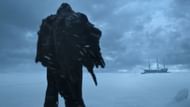Guillermo del Toro's Frankenstein is a gothic science fiction film based on Mary Shelley's novel of the same name. The film's main cast features Oscar Isaac as the ambitious scientist Victor Frankenstein, and Jacob Elordi as the Creature. The supporting cast features Mia Goth, Christoph Waltz, Felix Kammerer, and Charles Dance, among others.
The story follows Victor Frankenstein who is driven by a desire to conquer death. In his quest, he creates a sentient being by assembling different human parts. The Creature, abandoned due to its hideous appearance, is forced to live in a hostile world, learning language and human nature, yet regularly facing rejection.
Disclaimer: This article contains spoilers about the film. Viewer's discretion advised.
The film concludes in Victor's final, desperate search for the Creature, a hunt that leads them to the Arctic. As he gets fatally wounded, Victor ultimately recognizes his failures and begs for forgiveness during his final moments. After granting his creator the forgiveness he desired, the Creature then leaves after achieving a sense of atonement and closure with its maker.
Frankenstein ending explained: The creature's humanized conclusion and Victor's final regret

Guillermo del Toro's adaptation reshapes Mary Shelley’s classic as a profoundly emotional tragedy, which is focused on the cycles of parental abuse and the quest for atonement. The film's climax brings the destructive conflict between Victor Frankenstein and his Creature to a devastating conclusion in the frozen wastes of the Arctic.
The film's conclusion is tragically tied to the fate of Elizabeth, who shares a unique, empathetic connection with the Creature throughout the plot. During the final scenes, Elizabeth is fatally wounded by a stray shot from Victor, who fires a gun in a jealous rage, as he couldn't bear the Creature speaking Elizabeth's name. This one word signifies a connection which he could never possess.
Elizabeth dies alone, giving the creature a profound sense of human connection at a heartbreaking moment when she shares her sense of being lost in the world. The loss of the one person who offered him empathy and a sense of belonging triggers his vengeful turn against his creator, transforming his sorrow into a cold rage that fuels the final hunt.
After Elizabeth's death, the plot shifts to Victor, who desperately searches for the creature, reflecting his own downfall into moral decay. The search reveals Victor as the true monster of the story: his arrogance and inability to accept responsibility for his creation's existence have resulted in a bloody trail of destruction and death.

The final confrontation between the Creature and his creator takes place in the harsh and cold landscape of the Arctic. Exhausted from the chase, both physically and psychologically, Victor is eventually caught by the weather and placed in Captain Anderson's hands, where he recounts his entire story. The subsequent scene depicts the dying Victor confronting the Creature one last time, with the Creature initially prepared to exact revenge.
In a powerful climax, the Creature confronts his dying creator. Victor, during his final breaths, stripped of his arrogance, admits his flaws and begs the Creature for forgiveness for abandoning him. This is a crucial moment in the narrative, an act of genuine regret, where Victor finally acknowledges the Creature as his responsibility and his kin.
The Creature grants Victor the forgiveness he desires after hearing the words of acceptance and apology that he has yearned for all his life. Victor finally dies in peace. The Creature concludes his story as a tragically humanized character by mourning his creator, the only being connected with him. Frankenstein concludes with the Creature's final, unburdened farewell to his creator.
Stay tuned for more updates.
